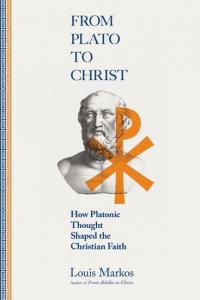
Should Christians read a pagan philosopher who teaches reincarnation, the superiority of knowledge, and a kind of salvation by works? Yes, at least if we want to stand in the grand tradition of faithful believers who have learned a lot from Plato. Louis Markos makes this case in From Plato to Christ: How Platonic Thought Shaped the Christian Faith.
For what it’s worth, I’m not a hard sell that Christians should read philosophy (my degree is in such ‘worldly wisdom’, after all), and that we can benefit from the insights therein. If you’ve been following along with the Common Grace posts on this site, you know I’m thoroughly convinced that God blesses the world with wisdom–including the wisdom of philosophers.
In From Plato to Christ, Markos gives us two separate but related discussions. In the first part, we are given an overview of Plato’s major works and ideas. (Markos’ discussion of The Laws is especially welcome–that’s a work that is overlooked far too often.) In the second part of the book, Markos briefly overviews how ten Christian thinkers have been influenced by Plato: Origen, Gregory of Nazianzus, Gregory of Nyssa, Gregory Palamas, Augustine, Boethius, Dante, Erasmus, Descartes, Coleridge, and C.S. Lewis.
And here’s where I think this book hits a slight hiccup. It’s certainly true that these are all major theologians or thinkers in history (with the possible exception of Coleridge, who is important, but perhaps not quite at the same level of influence as the others). But most of them aren’t places to go for great theology. Some of them dance on the edge of heresy, and at least one of them wanders over that edge. Even the great theologians on this list (Augustine and the first two Gregories listed) have their weaknesses–weaknesses that can at least in part be attributed to their incorporation of Platonic ideas into their theology. It’s probably important that the single author most influenced by Platonic ideas who directly influenced Christianity–Pseudo-Dionysius–is completely ignored in this book.
But! To say that some of Plato’s ideas have negatively influenced Christian doctrine doesn’t mean that all of his ideas have a negative impact. What’s more, Plato’s writings and the writings of those whom he has influenced are helpful guides for Christians trying to understand and navigate the world. From Plato to Christ is a great way to step into reading and appreciating what Plato has to say to the church. In taking such a step, you’ll be in good company.
Dr. Coyle Neal is co-host of the City of Man Podcast and an Associate Professor of Political Science at Southwest Baptist University in Bolivar, MO












